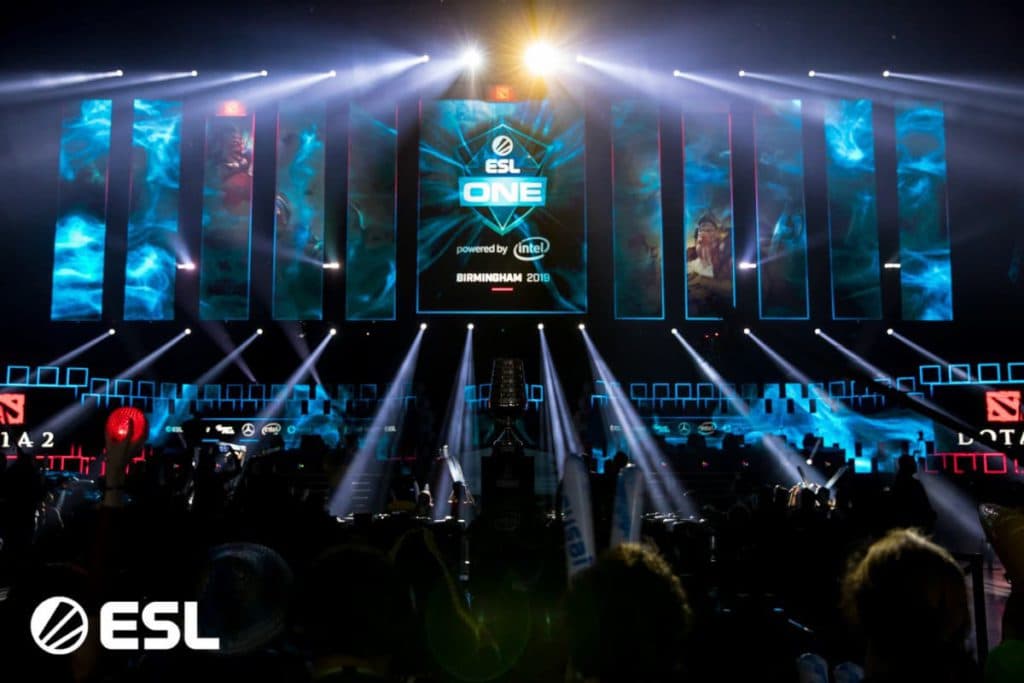How will the the Saudi-backed acquisition of ESL effect the competitive Dota 2 space. Will it be a rocky ride? Or is Dota pre-prepared for this kind of merger?
With the acquisition of ESL for over $1 billion by the Savvy Gaming Group, an organization backed by the Saudi Arabian Public Investment Fund, Dota 2 esports fans were left with many questions.
Following the purchase, a Saudi government-backed company now runs some of the biggest Dota 2 events in the world. With Saudi Arabia diversifying its investments away from oil, which has historically been the source of its wealth, conventional sports and esports are now targets for investment by the Middle Eastern monarchy. But with potential backlash linked to Saudi Arabia’s poor record in human rights, it’s natural to assume this acquisition will somehow affect competitive Dota 2.
Will teams boycott the events? Will they be able to? Could Valve step in and drop ESL as a tournament organizer? Could talent, players, or fans affect change? We’ll attempt to answer these questions below.
What Dota events does ESL run?

While some might consider ESL to be primarily a CS:GO tournament runner, its links to Dota 2 are very deep. ESL most notably and visibly is the current organizer (unsurprisingly) of ESL One Winter 2021, commonly known as the DPC NA 2021/2022 Tour 1. Additionally, ESL owns DreamHack and its subsidiary DreamLeague. DreamLeague has been the league runner for the Western European DPC since January 2021.
Beyond this, the ESL has hosted Dota 2 Majors under its ESL One branding for years. Various ESL One events have become the sites of some of the most historic moments in Dota 2.
Put simply, Dota 2 has a lot of important events organized by ESL. So, hypothetically, if someone wanted to make a stand against the ESL’s new ownership, you’d be cutting off your nose to spite your face.
Refusing to participate in ESL events would cut you off from DPC points. With Dota 2 built almost entirely around The International, giving up any DPC points is tantamount to giving up on Dota as a whole. And given ESL’s non-DPC events often have large prize pools as well, it’s unthinkable to give up ESL
Related articles
Dota’s links to Saudi Arabia

Even before the ESL acquisition, followers of Dota 2 will have known of a seemingly more harmless transaction related to Saudi Arabia. For the past few years, a Steam account allegedly owned by Prince Abdullah bin Salman bin Abdulaziz Al Saud has made headlines.
Purported to belong to a member of the Saudi royal family, an account with the Steam ID Abdullah Al Saud has purchased over $100,000 in Battle Pass levels in the past three years. This would make them the single largest independent contributor to TI prize pools in history.
Beyond this, Nigma Galaxy, the team founded by one of European Dota’s most storied rosters, is firm in its commitment to the MENA (Middle East and North Africa) region. Since 2020, the org has spearheaded organizing MENA tournaments and initiatives. These include a $10,000 tournament in May 2020, and Nigma's merger with Galaxy Racer in 2021. These projects seem to be a whole team effort, with multiple team members vocally supporting the growth of MENA esports in official interviews. While Nigma Galaxy primarily operates within the United Arab Emirates, doing business within the Gulf Cooperation Council sphere almost always means doing business with Saudi Arabia.
The point is this isn’t anything new for Dota 2. Valve, and teams within Dota are already comfortable with doing business in the Gulf region. Valve will gladly take Saudi money when they’re paying for Battle Passes. There’s no reason why they’d sever ties with ESL over their new ownership. The first ship had sailed long before the ESL deal was even thought up.
Already Inoculated

The almost worrying conclusion is that while the ESL merger will bring in the bitter taste that comes with accepting Saudi money, most parties are already ready to swallow it. Yes, Saudi Arabia has an allegedly awful record on human rights, but most are willing to overlook it for a number of reasons.
This is no more visible than in the case of English Football. Premier League side Newcastle United and Championship team Sheffield United are both owned by Saudi-backed groups. Newcastle in particular, is owned by the same Saudi Arabian Public Investment Fund that owns the Savvy Gaming Group, new owners of ESL. And while this creates its own issues of competitive integrity, the real issue is that no one seems to care about the dismal record of human rights abuses from the country of Saudi Arabia. Perhaps because, the exact same issues of intolerance are symptomatic within English football itself.
Similarly, perhaps Dota is pre-primed to ignore the issues with accepting Saudi money because it’s already acclimatized to those issues. Maybe hearing that women are treated like second-class citizens in Saudi Arabia isn’t surprising if you’ve spent any time in the Dota 2 scene. What if you’re pretty much immune to hearing about the oppression of LGBT people and poor treatment of migrant workers in the country, when every few months it seems a pro player gets banned for using a racial or homophobic slur?
If these comparisons seem to be overblown, that a smaller issue within Dota is being compared to a huge issue in Saudi Arabia, then consider that that’s exactly what an inoculation is. It’s using a small amount of something toxic so you’re prepared for the big toxicity later on.
Ultimately, while the ESL acquisition will rattle cages and upset people, it will not bring sweeping change and outrage to Dota 2. The game is already dealing with its own existential crisis, and struggling not to implode. ESL’s sale to Savvy Gaming Group is the least of its concerns.